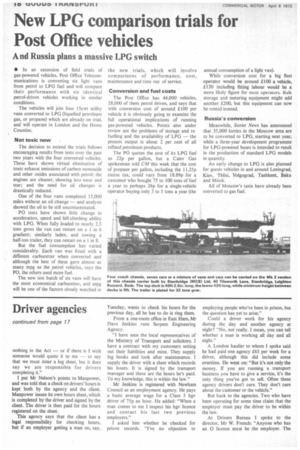New LPG comparison trials for Post Office vehicles
Page 20

If you've noticed an error in this article please click here to report it so we can fix it.
And Russia plans a massive LPG switch
• In an extension of field trials of gas-powered vehicles, Post Office Telecommunications is converting six light vans from petrol to LPG fuel and will compare their performance with six identical petrol-driven vehicles working in similar conditions.
The vehicles will join four 15cwt utility vans converted to LPG (liquefied petroleum gas, or propane) which are already on trial. and will operate in London and the Home Counties.
Not toxic now • The decision to extend the trials follows encouraging results from tests over the past two years with the four converted vehicles. These have shown virtual elimination of toxic exhaust emissions of carbon monoxide and other oxides associated with petrol; the engines are cleaner, showing less wear and tear; and the need for oil changes is drastically reduced.
One of the four vans completed 15,000 miles without an oil change — and analysis showed the oil to be still uncontaminated.
PO tests have shown little change in acceleration, speed and hill-climbing ability with LPG. When fully loaded to nearly 2.5 tons gross the van can restart on a 1 in 6 gradient; similarly laden, and towing a half-ton trailer, they can restart on a 1 in 8.
But the fuel consumption has varied considerably. Each van was fitted with a different carburetter when converted and although the best of these gave almost as many mpg as the petrol vehicles, says the PO, the others used more fuel.
The new test batch of six vans will have the most economical carburetter, and mpg will be one of the factors closely watched in the new trials, which will involve comparisons of performance, cost, maintenance and time out of service.
Conversion and fuel costs The Post Office has 44,000 vehicles, 28,000 of them petrol driven, and says that with conversion cost of' around £100 per vehicle it is obviously going to examine the full operational implications of running gas-powered vehicles. Points also under review are the problems of storage and refuelling and the availability of LPG — the present output is about 2 per cent of all refined petroleum products.
The PO quotes the cost of its LPG fuel as 22p per gallon, but a Calor Gas spokesman told CM this week that the cost of propane per gallon, including the 11.25p excise tax, could vary from 18.89p for a customer who bought 75 to 100 tons of fuel a year to perhaps 26p for a single-vehicle operator buying only 3 to 5 tons a year (the
annual consumption of a light van).
While conversion cost for a big fleet operator would be around ,£100 a vehicle, £120 including fitting labour would be a more likely figure for most operators. Bulk storage and metering equipment might add another £200, but this equipment can now be rented instead.
Russia's conversion
Meanwhile, Soviet News has announced that 35,000 lorries in the Moscow area are to be converted to LPG, starting next year, while a three-year development programme for LPG-powered buses is intended to result in the production of standard LPG models in quantity.
An early change to LPG is also planned for goods vehicles in and around Leningrad, Kiev, Tblisi, Volgograd, Tashkent, Baku and Minsk.
All of Moscow's taxis have already been converted to gas fuel.












































































































